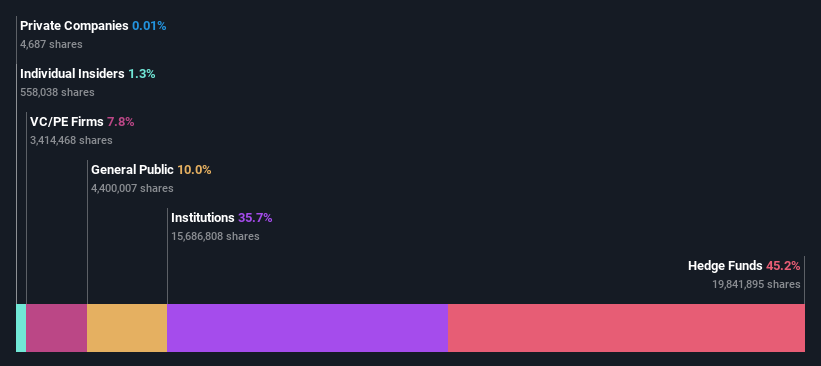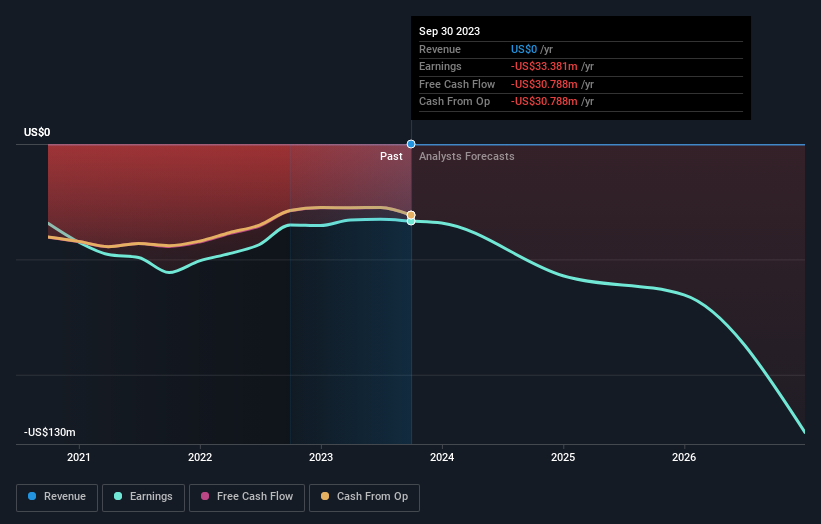- United States
- /
- Biotech
- /
- NasdaqGM:LRMR
A great week that adds to Larimar Therapeutics, Inc.'s (NASDAQ:LRMR) one-year returns, hedge funds investors who own 45% must be happy

Key Insights
- Institutions' substantial holdings in Larimar Therapeutics implies that they have significant influence over the company's share price
- The top 3 shareholders own 53% of the company
- Insiders have bought recently
To get a sense of who is truly in control of Larimar Therapeutics, Inc. (NASDAQ:LRMR), it is important to understand the ownership structure of the business. And the group that holds the biggest piece of the pie are hedge funds with 45% ownership. Put another way, the group faces the maximum upside potential (or downside risk).
And last week, hedge funds investors ended up benefitting the most after the company hit US$208m in market cap. One-year return to shareholders is currently 4.7% and last week’s gain was the icing on the cake.
Let's delve deeper into each type of owner of Larimar Therapeutics, beginning with the chart below.
View our latest analysis for Larimar Therapeutics

What Does The Institutional Ownership Tell Us About Larimar Therapeutics?
Many institutions measure their performance against an index that approximates the local market. So they usually pay more attention to companies that are included in major indices.
As you can see, institutional investors have a fair amount of stake in Larimar Therapeutics. This can indicate that the company has a certain degree of credibility in the investment community. However, it is best to be wary of relying on the supposed validation that comes with institutional investors. They too, get it wrong sometimes. When multiple institutions own a stock, there's always a risk that they are in a 'crowded trade'. When such a trade goes wrong, multiple parties may compete to sell stock fast. This risk is higher in a company without a history of growth. You can see Larimar Therapeutics' historic earnings and revenue below, but keep in mind there's always more to the story.

Our data indicates that hedge funds own 45% of Larimar Therapeutics. That's interesting, because hedge funds can be quite active and activist. Many look for medium term catalysts that will drive the share price higher. Our data shows that Deerfield Management Company, L.P. Series C is the largest shareholder with 39% of shares outstanding. Meanwhile, the second and third largest shareholders, hold 7.8% and 6.6%, of the shares outstanding, respectively.
A more detailed study of the shareholder registry showed us that 3 of the top shareholders have a considerable amount of ownership in the company, via their 53% stake.
While studying institutional ownership for a company can add value to your research, it is also a good practice to research analyst recommendations to get a deeper understand of a stock's expected performance. There are a reasonable number of analysts covering the stock, so it might be useful to find out their aggregate view on the future.
Insider Ownership Of Larimar Therapeutics
While the precise definition of an insider can be subjective, almost everyone considers board members to be insiders. The company management answer to the board and the latter should represent the interests of shareholders. Notably, sometimes top-level managers are on the board themselves.
I generally consider insider ownership to be a good thing. However, on some occasions it makes it more difficult for other shareholders to hold the board accountable for decisions.
We can see that insiders own shares in Larimar Therapeutics, Inc.. It has a market capitalization of just US$208m, and insiders have US$2.6m worth of shares, in their own names. This shows at least some alignment. You can click here to see if those insiders have been buying or selling.
General Public Ownership
With a 10% ownership, the general public, mostly comprising of individual investors, have some degree of sway over Larimar Therapeutics. While this group can't necessarily call the shots, it can certainly have a real influence on how the company is run.
Private Equity Ownership
Private equity firms hold a 7.8% stake in Larimar Therapeutics. This suggests they can be influential in key policy decisions. Some investors might be encouraged by this, since private equity are sometimes able to encourage strategies that help the market see the value in the company. Alternatively, those holders might be exiting the investment after taking it public.
Next Steps:
I find it very interesting to look at who exactly owns a company. But to truly gain insight, we need to consider other information, too. Consider for instance, the ever-present spectre of investment risk. We've identified 4 warning signs with Larimar Therapeutics (at least 2 which are potentially serious) , and understanding them should be part of your investment process.
If you are like me, you may want to think about whether this company will grow or shrink. Luckily, you can check this free report showing analyst forecasts for its future.
NB: Figures in this article are calculated using data from the last twelve months, which refer to the 12-month period ending on the last date of the month the financial statement is dated. This may not be consistent with full year annual report figures.
New: AI Stock Screener & Alerts
Our new AI Stock Screener scans the market every day to uncover opportunities.
• Dividend Powerhouses (3%+ Yield)
• Undervalued Small Caps with Insider Buying
• High growth Tech and AI Companies
Or build your own from over 50 metrics.
Have feedback on this article? Concerned about the content? Get in touch with us directly. Alternatively, email editorial-team (at) simplywallst.com.
This article by Simply Wall St is general in nature. We provide commentary based on historical data and analyst forecasts only using an unbiased methodology and our articles are not intended to be financial advice. It does not constitute a recommendation to buy or sell any stock, and does not take account of your objectives, or your financial situation. We aim to bring you long-term focused analysis driven by fundamental data. Note that our analysis may not factor in the latest price-sensitive company announcements or qualitative material. Simply Wall St has no position in any stocks mentioned.
About NasdaqGM:LRMR
Larimar Therapeutics
A clinical-stage biotechnology company, focuses on developing treatments for rare diseases using its novel cell penetrating peptide technology platform.
Flawless balance sheet and good value.


